Sanur, Bali, 3-4 September 2025
The International Association of Facilitators (IAF)
Asia Conference 2025
Facilitation for Hope
A Journey of Connection, Reflection, and Co-Creation
We are living in an age of profound uncertainty
an era that many experts refer to as a polycrisis. Systemic challenges such as climate change, social inequality, geopolitical conflicts, technological disruption, and a growing distrust in institutions are no longer isolated issues. They are deeply interconnected, amplifying one another’s impact and creating a web of complex problems that can no longer be solved with fragmented or one-dimensional approaches.

In the face of this complexity, technical solutions and top-down directives alone are no longer sufficient. The world urgently needs new ways of thinking, working, and relating. We need safe spaces where empathy can flourish, where meaningful dialogue is revived, and where solutions are co-created collectively. This is the essence of facilitation—a transformative skill and mindset that enables individuals and groups to move from confusion to clarity, from division to understanding, and from stagnation to collective action.
Polycrisis related to global risks landscape – as illustrated by Global Risks Perception Survey 2025 from World Economic Forum
Yet today, we face tangible obstacles: the scarcity of spaces for meaningful conversations amidst fast-paced work cultures; a general lack of awareness of how facilitation can genuinely shape the direction of organizations and communities; and the limited availability of learning platforms that are truly participatory across sectors and borders.
In responding to polycrisis that is profoundly affecting our sustainability, what are we going to do about it? Are we going to sit still, let everything pass before our eyes? Can we shape our future together? What kind of future that we want our children and grandchildren to live?
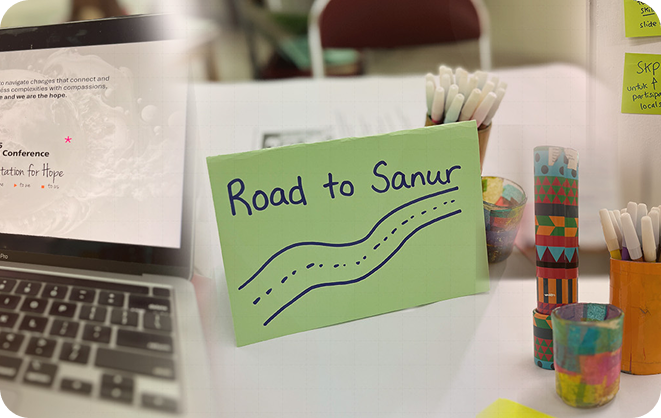
IAF Asia Conference 2025 is not just a conference
it is an immersive, transformative journey. Designed with an experiential format at its core, this event invites everyone—whether you are a speaker, participant, organizer, or supporting team—to engage deeply, reflect meaningfully, and co-create insights together. It is a safe and inclusive space where we can have a deep and meaningful conversation with friends, going beyond information-sharing, allowing us to explore truth, meaning, and embodied learning so we can collaboratively strengthening our capacity for navigating the complex world of today.
No matter what sector you come from—public, private, or civil society—you are welcomed here. The challenges we face today are too interconnected and too urgent to be solved in silos. Now more than ever, we need cross-sector dialogue, collective intelligence, and systems approach to navigate complexity. This conference offers a space to share your tools, experiences, and ideas, while also inviting you to pause, listen, and learn from others. It’s about growing together as a learning community, united by the belief that facilitation can help shape a more compassionate, collaborative, and sustainable world.
This year, Indonesia has the privilege and honor of hosting the IAF Asia Conference 2025. We warmly welcome facilitators, changemakers, and system-thinkers from across the globe to gather in Bali—a place long known for its spirit of connection, reflection, and harmony. Guided by the theme “Facilitation for Hope,” we envision this conference as a shared space to reconnect, regenerate, and reimagine the future we want to create—together.
From Me – To We – To Us.
COLLECTIVELY SHAPING OUR FUTURE.
Purposes of the Conference
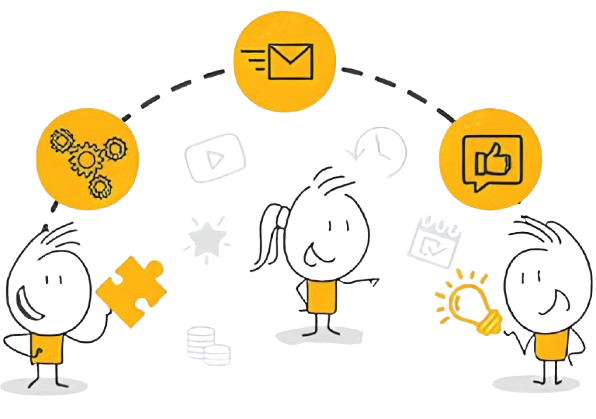
Promoting Facilitation and IAF
To raise awareness of facilitation as a vital skill for navigating complexity and highlight IAF’s global role in setting professional standards and fostering impactful facilitation practices.
Sharing, Learning and Reflection
To create a welcoming and mindful space for exchanging insights, tools, and experiences—encouraging deep reflection and collective growth across cultures and sectors.
Strengthening the Facilitation Community
To unite facilitators as a global community, working collaboratively to address systemic challenges and co-create a more compassionate and sustainable future.
Conference Events :
1. Road to Sanur
bi-weekly to monthly events
A series of engaging events held both offline and online leading up to the main conference, to raise public awareness about the value of facilitation as a critical skill to navigate and address the complexities of today’s world.
The Road to Sanur will be done in collaboration with any IAF Chapters or organizations that share similarity with IAF. It is a space for us to share perspectives, techniques and tools related to facilitation prior to the conference. We encourage you to contact us for having a shared sessions together, by emailing us on asiaconference2025@iaf-id.org.
Key objectives:
i. Introducing the means of facilitation while promoting IAF values
ii. Building awareness of the IAF Asia Conference
iii. Cultivating engagement to participate in the IAF Asia Conference and building engagement for attending the conference.
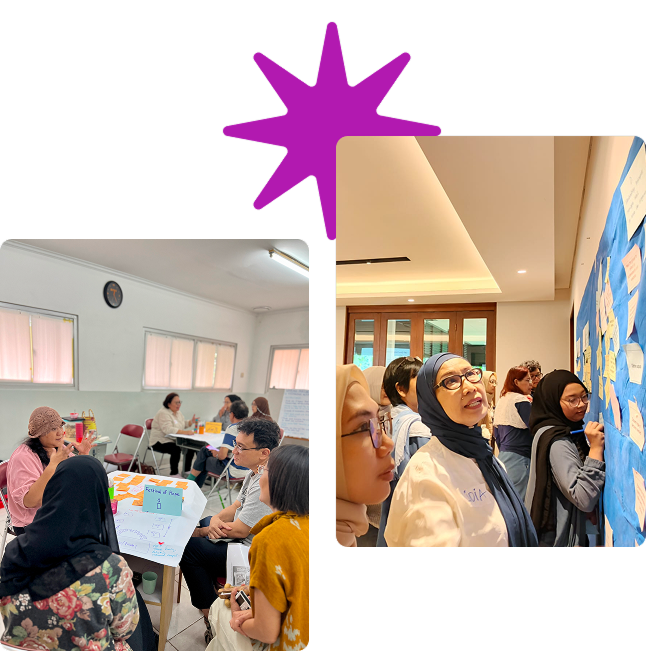
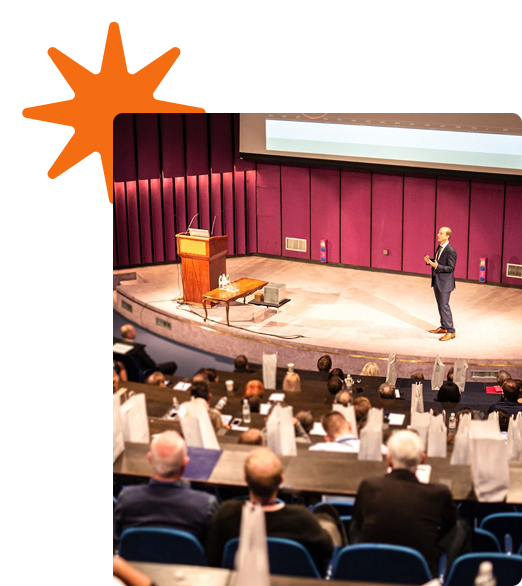
2. The Main Conference
3-4 September, 2025
The conference will be attended by facilitation practitioners from all over the world, to sharing their knowledge and wisdom on many fields related to facilitation.
Key objectives:
i. Enhancing awareness of how we can shape our sustainability together through facilitation
ii. Experiencing a collaborative and inclusive climate through embodying compassion
iii. Enriching facilitation repertoire with tools and methods that can promote systemic solutions
Upon closing the Call for Proposals on May 1, we received 90 entries of submission from India, Singapore, Malaysia, Taiwan, Japan, the UK, and of course – Indonesia. This is a promising fact that sessions in the conference will be rich and insightful.
The Rundowns
Below are the tentative schedules of the conference. Details of speakers for each concurrent session will be available around the 2nd – 3rd week of July.
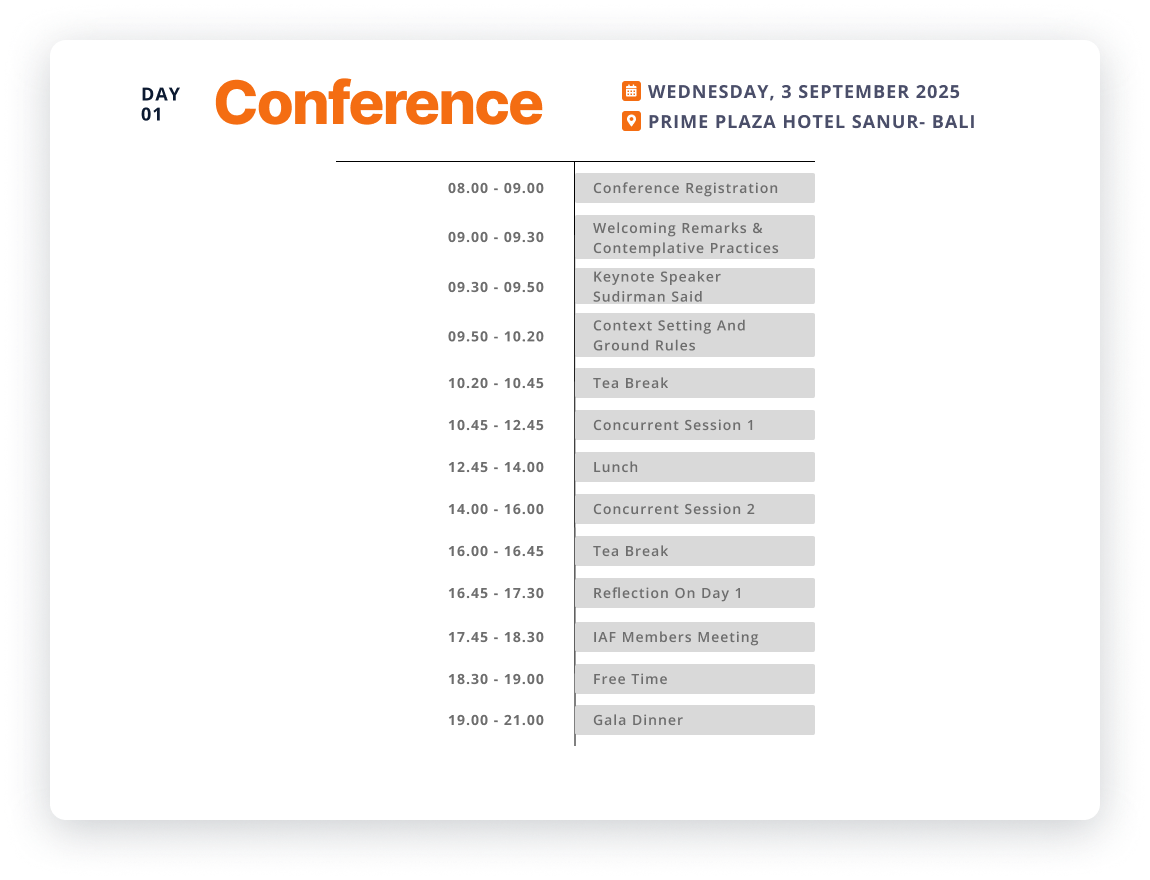
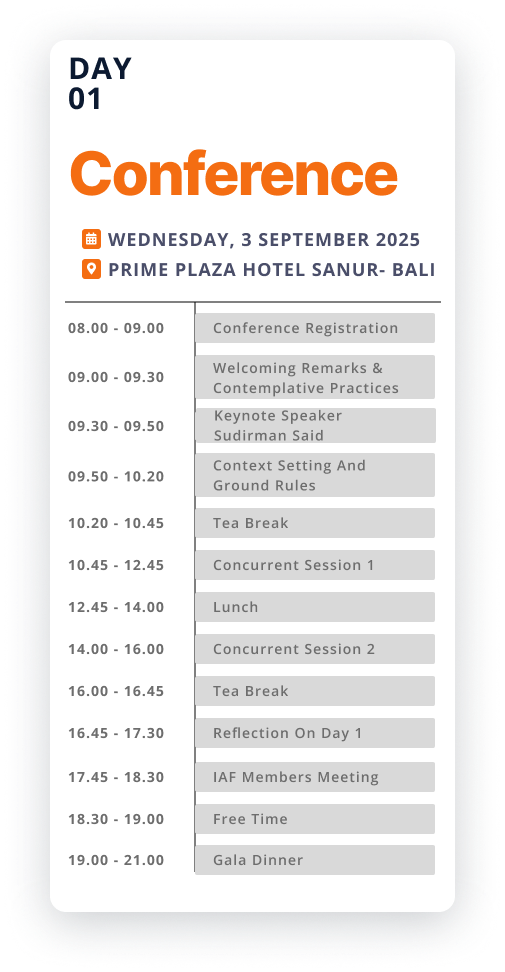
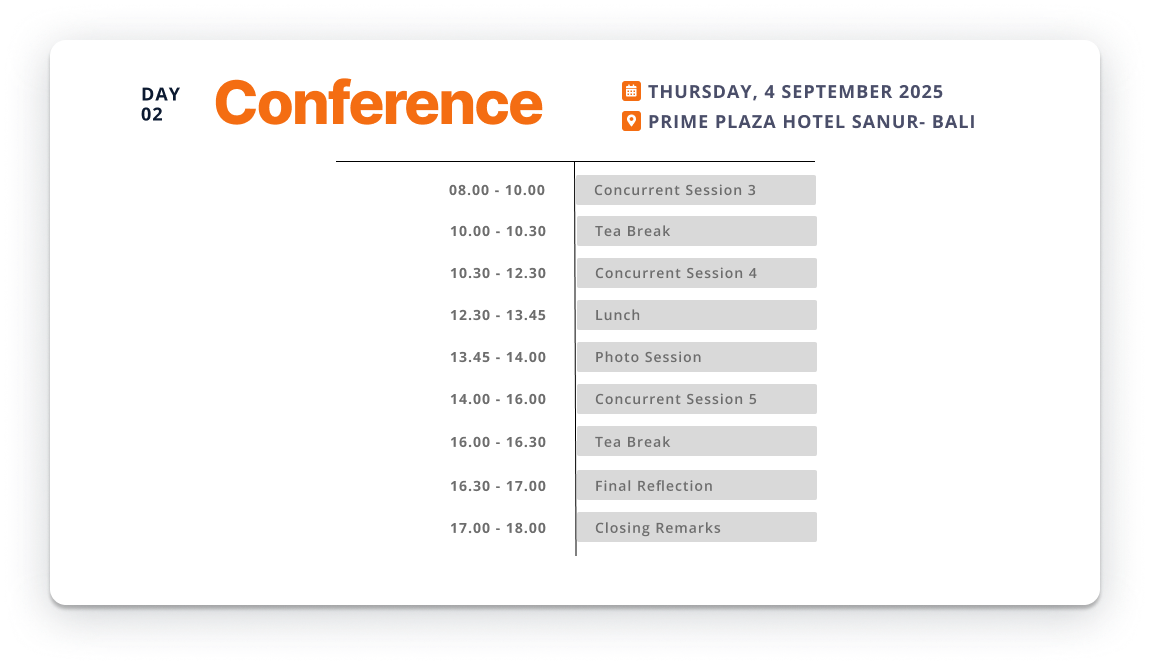
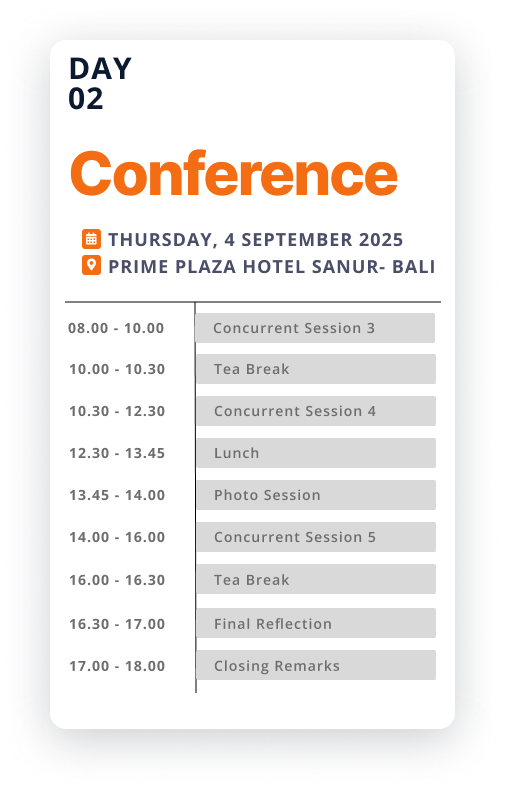
The Speakers
Raising Our Heads Above The Clouds: The Power Of Hope In Action
10:45 – 12:45
D1/1/A
The facilitation session holds at its heart the well-being of all who have been made vulnerable by the effects of conflict, tension and stress. We explore ways to raise our heads above the clouds by providing opportunities to rewrite our past encounters and overcome challenges. Through a facilitated process of “Journal Feedback to Feed-Forward”, we are invited to go deeper in our reflections; and often times new insights may come up. This process brings about a transformation of awareness.
We nurture resilience and aspiration, capabilities, skills and talents. Through a facilitated “Inner Wisdom Dialogue”, we connect with our inner wisdom and the knowing we have in each of us. We invoke the wisdom figure(s) to assist us in the reconnect. The outcome is a quality of wholeness and rainbow of hope. Experiences can be our new resource and stepping stones. The facilitated process raises determination and zeal, and invokes renewed commitment to take charge and be empowered.
Speakers:

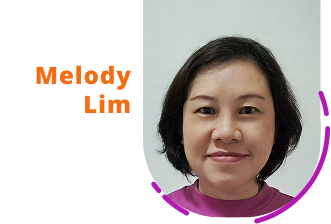
From Holding Space to Healing Space: Gratitude in Action
10:45 – 12:45
D1/1/B
Facilitators are frequently the silent anchors, holding space, managing complexity, and creating possibilities for others. But when was the last time you held space for yourself?
This 2 – hour immersive session enables you to pause, reflect, and reconnect with your personal reservoir of hope and gratitude. It is designed for both experienced and new facilitators, and it combines storytelling, appreciative inquiry, interactive group processes, and creative reflection.
You’ll examine moments of personal and collective hope, the transformational power of gratitude in facilitation, and how appreciation can change the vibe in the room—from burnout to belonging, transaction to transformation.
Through a series of structured divergence and convergence activities, you will co-create insights, and leave with a practical Gratitude Action Plan—tools you can carry into any facilitation space.
Come to be recharged, to give and receive appreciation, and to return to your work with renewed clarity and compassion.
Hope doesn’t just happen. It’s facilitated. And gratitude is the bridge.
Join us on this journey—from holding space to healing space.
Speakers:

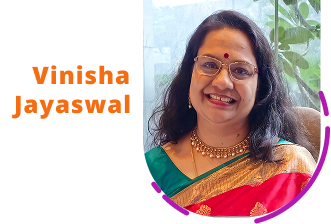
Session Invitation: Listening on All Layers — Leadership Through Embodied Listening
10:45 – 12:45
D1/1/C
In a world where complexity and uncertainty are the new normal, leadership requires more than just strategic thinking — it demands deep sensing, presence, and connection. Join us for a 2-hour immersive session where we will explore Listening on All Layers: practices that awaken the intelligence of the body and cultivate deep, systemic leadership presence.
While the brain contains around 86 billion neurons, the gut holds about 500 million neurons, and the heart has its own network of over 40,000 neurons. Science now affirms what ancient practices have long known — true leadership intelligence is distributed throughout the entire body.
In this session, you will embark on a personal journey of self-inquiry, tapping into the innate wisdom that exists beyond the mind. Through practices such as somatic partnering, simple forms of systemic constellation, body-based coaching, and right-brained listening techniques, we will prime your body to sense the field more deeply — fostering compassionate, resilient, and coherent teams.
Each participant will leave with a new, embodied sense of their sensing ability, greater ease in navigating complexity, and simple practices to integrate into daily life and in the workplace. These modalities will help sustain clarity, compassion, and resilience in the face of ongoing change.
Come discover how listening through the whole self unlocks transformational leadership capacities.
Let’s reimagine leadership — from the inside out.
Speakers:
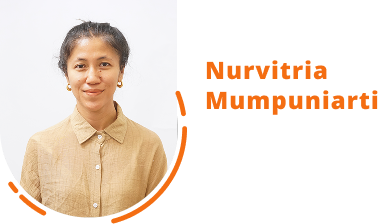
Navigating the Craziness of the World: Walking Your Story as a Facilitator
10:45 – 12:45
D1/1/D
Rather than teaching tools or techniques, this session invites deep reflection through storytelling, embodiment, and dialogue. Together, we’ll explore the personal and professional tensions we hold—offering hope to others while navigating uncertainty ourselves.
Guided by long-time facilitator companions Amy and Nami, the session is inspired by their heartfelt dialogues with fellow practitioner Jimmie White, who brings a unique lens to this work through his exploration of the physics of facilitation. His insights have helped shape this gathering into a space where presence matters more than performance, and where energy, gravity, and flow become metaphors for how we hold ourselves and each other.
We’ll ask:
Who am I as a facilitator in this moment?
What struggles am I holding—and what still gives me hope?
How do I show up, not as an expert, but as a human being?
Through the “Russian Doll” process and “Walking Your Story” reflection, you’ll rediscover connection, reframe your narrative, and experience the quiet power of being in community.
In this time of poly-crisis, let us practice facilitation not just as a skill, but as a way of healing and holding space for a more compassionate, connected, and flourishing future—together.
Speakers:
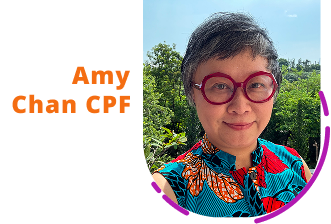
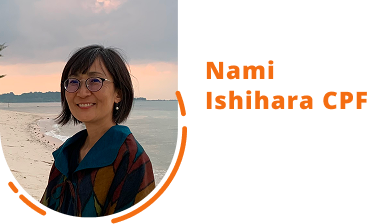
Hope Through Emotes & Strokes
10:45 – 12:45
D1/1/E
We’ll begin by choosing strokes that match how we feel and connecting with others through those strokes. Then, through guided imagery and a special group art activity, we’ll express our feelings on paper and pass them on. Each person will add their emotions to someone else’s canvas—layer by layer, stroke by stroke—creating a beautiful story of shared feelings.
In the end, everyone gets their original artwork back to complete it in their own way. It’s a powerful moment, claiming your journey, with support from others along the way.
This session is about more than just drawing or painting. It’s about connecting, understanding, and feeling lighter together. You don’t need to be an artist, just bring your open heart.
Come join us to slow down, reflect, and leave with a sense of hope, strength, and meaningful connection.
Speakers:

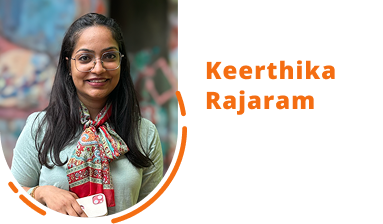
Building Appreciative Resilience
10:45 – 12:45
D1/1/F
In times of change and uncertainty, resilience is essential — but not just any resilience. The Appreciative Resilience model invites us to move beyond surviving into thriving, by consciously embracing strengths, meaning, and connection even in adversity. Rooted in Appreciative Inquiry, this model developed by Dr. Joan McArthur-Blair and Jeanie Cockell highlights three dynamic practices: Hope, Despair, and Forgiveness.
Rather than bypassing struggle, Appreciative Resilience acknowledges the emotional landscape of challenge and offers practical tools to stay grounded, uplifted, and purposeful. It teaches us to tap into the power of appreciative storytelling, reframe difficult experiences, and foster courageous conversations — all while staying true to our values.
Join us in this reflective and interactive session to explore how you can develop deeper personal and collective resilience. Whether you’re leading a team, navigating transitions, or seeking renewal, this approach will offer you fresh perspectives and actionable insights to build sustainable well-being and leadership capacity.
Come discover how to hold space for both struggle and strength — and emerge more connected, compassionate, and resilient
Speakers:
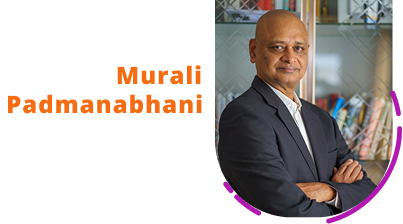
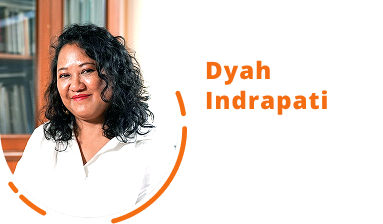
Developing and Facilitating Hopeful Conversations in Diverse Environments
14:00 – 16:00
D1/2/A
We are in a time of change – one challenge facing facilitators is how to help our selves and our clients explore that change from a realistic hopeful perspective.
- During this session I wil share my work based on three elements that affect every facilitative situation
- Mindset or image using the Cynefin framework
- Using the ICA Wave Process as a method
- Applying Appreciative Inquiry as an approach
- Using a dialgoue process for disernment
Depending on the group size and diversity we will choose one or more “crises” and explore how to assess our understanding of the environment. This assessment of the operating context allows for designing focused facilitation process. Diverse methods becime an option which can help the person or group shape a respectful yet deep collective discernment and needed actions.
Our process will be to understand or create a shared context, develop a conversation, practice together, and reflect/ debrief/ add options for future practice.
Speakers:

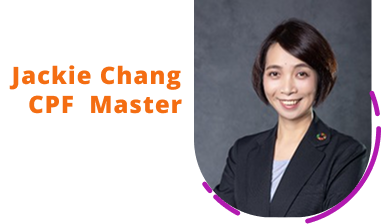

The Facilitator; Essential for Teams and Organizations Navigating Turbulent Times
14:00 – 16:00
D1/2/B
Speakers:
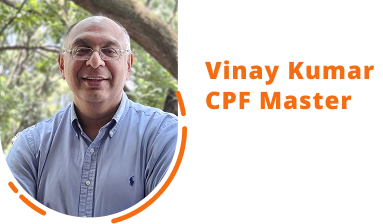

Facilitating Resilience in an Even (More) VUCA World
14:00 – 16:00
D1/2/C
VUCA: VOLATILE, UNCERTAIN, COMPLEX, AMBIGUOUS – four powerful words that resonate even more critically now than when the acronym was first introduced nearly 40 years ago. Our world seems to be hurtling towards being even more VUCA. From a personal perspective it’s so easy to: become overwhelmed and descend into anxiety; project fears onto others; become an ostrich and pretend it isn’t happening; freeze to inaction or unleash chaos around us.
If this happens for individuals, what is the impact on the groups we facilitate as they collectively navigate their way through this? What can we do to help groups steer their way through this mess? How to maintain hope and be resilient?
In this session we’ll explore how our VUCA world is impacting what we do as facilitators. Then we’ll introduce a 4-step FRAMEWORK FOR RESILIENCE to use with group/s (organisational, community) and for ourselves as facilitators. Rhonda has used this method powerfully numerous times to help groups navigate their VUCA environments and emerge from workshops with practical solutions and plans. The approach awakens hope and optimism.
Rhonda and Audrey look forward to working with you as we collectively explore your own and your clients’ VUCA worlds and demonstrate an effective approach to mitigate the impact of VUCA by building resilience.
Along the way we’ll also give many facilitation tips based on what emerges in the room.
Speakers:
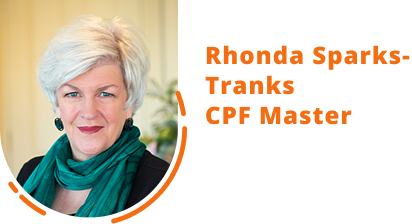

Facilitating Between the Lines: Holding Hope through Silence and Embodied Presence
14:00 – 16:00
D1/2/D
Honouring both the inner landscape of the facilitator and the collective possibilities that arise from presence, this experiential journey is designed for those who sense that hope is not something we deliver – it’s something we hold. Together, we will engage with silence not as absence, but as an active presence: a space where inner alignment, resilience, and shared insight can take root.
Participants will experience a carefully held arc that weaves embodied practice, journaling, quiet facilitation, and reflective dialogue. This is not a technical toolkit session – it is a space to feel, notice, and integrate. You will leave with greater clarity on how silence can expand your facilitation stance, how presence can become a strategic choice, and how your well-being shapes what becomes possible in the spaces you hold.
Come with your questions, come as you are – and discover what emerges when we listen to what is not said, and hold space for hope through grounding and presence.
Speakers:
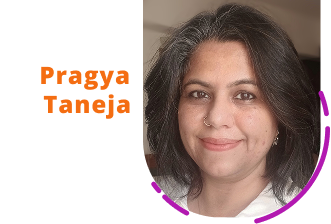
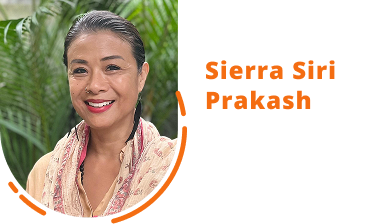
Leading with Empathy through Disruption and Uncertainty
14:00 – 16:00
D1/2/E
Since 2020, disruption has become the norm—not a blip but a relentless force. KPIs mutate overnight from pandemic-induced lockdowns to hybrid work shifts, collapsing supply chains, to AI-driven transformations. The ground beneath us keeps shifting. You’re rebuilding the wings of an airplane mid-flight while the destination vanishes and reappears like a mirage.
Agility alone is insufficient in this landscape. Agility assumes a fixed endpoint with flexible pathways. Today, the endpoint is a moving target, and innovations from yesterday become obsolete.
In such volatility, psychological safety isn’t a luxury—it’s the oxygen that sustains survival.
When teams feel safe, uncertainty transforms from a threat into a catalyst. This safety isn’t about eliminating risk but creating an environment where vulnerability is the norm and mistakes become learning opportunities. Innovation thrives because people feel secure enough to experiment boldly at the edge of chaos.
- Today, we’ll explore how leaders can build this essential safety net:
- Normalize uncertainty: Acknowledge what you don’t know. Your vulnerability creates permission for authentic collaboration.
- Reframe failure: When experiments fail, ask, “What did we learn?” to convert setbacks into stepping stones toward clarity.
- Anchor in purpose: When processes and plans crumble, a shared “why” keeps teams cohesive and resilient.
You’ll leave with practical guidelines for fostering psychological safety that converts disruption into opportunity and the confidence to guide your organization forward, not just to survive the disruptions but to harness its energy and thrive within it.
Speakers:

S.E.R.V.E to Facilitate: Creating Spaces of Hope and Transformation
14:00 – 16:00
D1/2/F
Join Dr. Shan Moorthi and Ho Sze Chieng in this highly experiential session where facilitation meets purpose-driven leadership. In a world grappling with complexity and change, the S.E.R.V.E framework offers facilitators and leaders a simple yet powerful roadmap to move groups from confusion to clarity, from challenge to possibility. Grounded in Eastern wisdom and contemporary facilitation tools, this session bridges heart and strategy to enable group and team transformation. In this hands-on session, participants will:
- Explore and apply the five phases of the S.E.R.V.E framework
- Engage in solution-focused conversations that unlock creativity and hope
- Design facilitation spaces that foster psychological safety, inclusivity, and shared vision
You’ll also learn how to guide diverse voices toward alignment and take away adaptable tools you can use immediately in your facilitation practice.
Whether you’re a seasoned facilitator or new to the field, this session will empower you to design transformative group processes that ignite courage, resilience, and action. Discover how to serve with intention and facilitate with impact.
Perfect for facilitators, team leaders, community builders, and change agents who want to inspire collaboration and co-create meaningful outcomes.
Speakers:


From ME to WE to US: How Facilitation can Breakthrough Boundaries to Change Your World
08:00 – 10:00
D2/3/A
In a world facing climate crisis, conflict, and inequality, facilitators have a vital role in moving people from isolation to collaboration. In this highly interactive session, you’ll experience a unique process that uses a specially designed BOX as a metaphor for shifting from a closed, fixed mindset to an open, connected one. Through reflection, dialogue, and hands-on activities, you’ll journey from “ME”—personal awareness—to “WE”—building deeper connection within your culture and language—and finally to “US”—bridging across cultures to create collective resilience.
To create a more inclusive experience, this session will be facilitated in multiple languages, including Japanese, Hindi, Chinese, Thai and English. By allowing participants to explore and express themselves in their preferred language, we move beyond English-dominant experiences and support deeper, more authentic connection. Join us to discover how facilitation can break through personal and cultural boundaries—and build a more compassionate, hopeful future together.
Speakers:

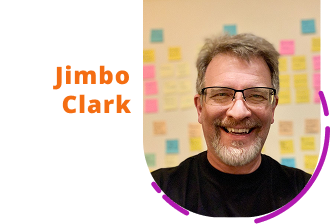
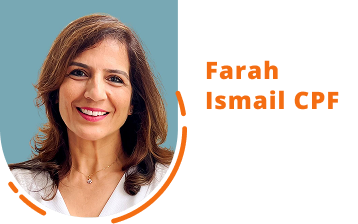
Romancing the Honeybees!
08:00 – 10:00
D2/3/B
Join us to explore and integrate the honeybee metaphor—its collaborative lessons, sustainable practices, leadership qualities, and Kamadeva’s inspiring arrows—to design facilitation strategies that cultivate and harvest collective hope.
By the end of this session, participants will be able to:
- Emulate the collaborative spirit of honeybees to design and participate in inclusive facilitation processes that leverage diverse perspectives and foster a sense of shared purpose.
- Apply sustainable facilitation practices, drawing inspiration from honeybees’ resourcefulness, to guide groups towards generating actionable and impactful solutions for a desired future.
- Cultivate leadership qualities inspired by the queen bee’s subtle influence, enabling them to guide groups with empathy and adaptability, creating a safe and nurturing environment for collective growth.
- Utilize the metaphorical “”arrows of Kaamdeva”” to ignite passion, build connection, and foster creativity within groups, effectively channelling collective energy towards realizing a hopeful vision.
- Synthesize these learnings to design a facilitation strategy that harvests potential, pollinates ideas, and builds a sustainable path towards a future filled with hope, reflecting the transformative power of collective effort.
Speakers:

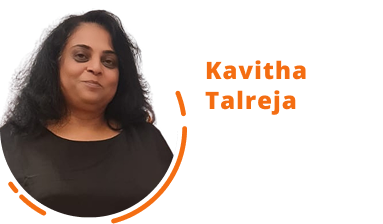
Leading with Heart - Stories of Hope and Change
08:00 – 10:00
D2/3/C
Are you a facilitator, leader, or change-maker eager to deepen your understanding of compassionate leadership in a global context? Inviting you for an immersive session “”Leading with Heart – Stories for Hope and Change.”” This engaging and practical session is designed to help you explore how stories—from diverse cultural backgrounds—serve as powerful tools to understand, model, and embody compassionate leadership.
What You Will Achieve:
• Appreciate how stories inspire hope and change across cultures
• Gain enhanced emotional awareness and reflection
• Identify and internalize Compassionate Leadership Qualities
• Develop actionable steps for Compassionate Leadership Growth
We welcome everyone who is committed to fostering inclusive and empathetic leadership in multicultural environments. Join us to explore new ways of facilitating, connecting and leading with the heart.
Speakers:
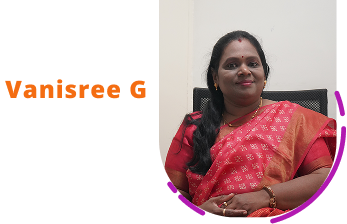
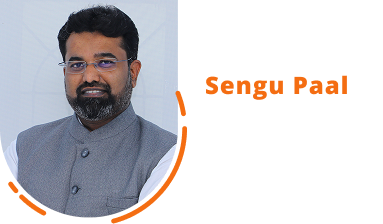
DAISY for Hope: Bridging Worlds, Building Belonging
08:00 – 10:00
D2/3/D
Bridging Worlds, Building Belonging
In an era shaped by polarization, migration, and climate shifts, how do we create spaces where everyone belongs?
Step into a powerful gathering of global facilitators as we explore stories, identities, and human connection across cultures, generations, and beliefs. This immersive session invites you to experience the DAISY framework—a unique approach to co-creating inclusive, compassionate, and hopeful futures.
What to Expect:
- Deep listening to lived experiences from across the globe
- Interactive co-creation of real-world actions
- Meaningful dialogue that transcends borders
- Tools to nurture cultures of belonging wherever you work
Let’s move from separation to connection—together.
Speakers:

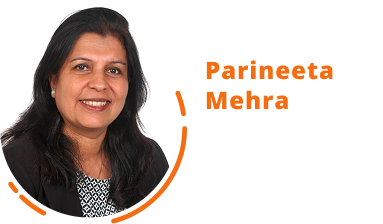
Illuminating Hope - Facilitating Transformation through Self-Awareness
08:00 – 10:00
D2/3/E
Join Dr. Stewart Desson, CEO of Lumina Learning and Ayleen Wisudha, Lumina Partner in Indonesia, in an experiential session designed for facilitators to navigate change and complexity. Lumina Learning’s transformative psychometric model will guide you to unlock paradoxical leadership traits—bold yet empathetic, structured yet adaptable—needed for resilient, human-centered facilitation.
Through reflective activities, small-group dialogues, and interactive activities, you will explore your natural preferences, uncover hidden strengths, and deepen emotional agility. Whether you are facilitating teams through crisis or designing inclusive spaces, this session equips you with practical insights and inner clarity to lead with courage, compassion, and agility.
Discover how diversity in personality can become a resource for collective breakthroughs and co-creation. Walk away not only inspired but also renewed—ready to embody hope in your practice and ignite it in others.
The session will demonstrate how the Lumina Spark personality portrait can be used to provide solutions for individuals, teams and organizations. You will receive your own complimentary Lumina Spark portrait that will deepen your self-understanding and enrich your participation in the workshop as well as other situations in your personal and work life.
Desired Outcome/Learning Outcome/Objectives:
- Understand how the psychology of personality provides an arena to embrace inclusivity and diversity in your facilitation
- Learn to harness paradoxes in personal and team dynamics
- Explore practical applications of Lumina Spark in crisis and change facilitation
Speakers:


Words that Build: Language as a Tool for Hope and Human Connection
08:00 – 10:00
D2/3/F
What if language isn’t just a medium, but a mirror—and a lever for change?
In this interactive session, we explore the astonishing power of language in shaping thought, culture, conflict, and connection. Drawing from the humour and history of Bill Bryson, the rigour of Chomsky and Pinker, and lived facilitation experiences across continents, this session offers facilitators a fresh lens to reflect on how language frames not just dialogue—but destiny.
Facilitators work with groups in conflict, in change, and in search of clarity. Language is both their brush and their canvas. And yet, too often, we default to scripts and styles that may exclude, marginalise, or distort. We’ll unpack:
- The tension between universal grammar and culturally shaped expression
- How metaphors impact meaning and group memory
- The role of language in creating belonging—or ‘othering’
- The facilitator’s responsibility in naming, reframing, and inviting
- Case stories where language enabled breakthroughs in conflict, equity, and transformation
This session is for anyone who has ever paused mid-workshop and thought: “There’s something in the way we’re speaking that’s shaping what we believe is possible”. Expect a mix of sharp ideas, shared inquiry, real stories, and (yes) a few laughs. Come curious. Leave with a renewed respect for the words we choose—and the worlds they create.
Speakers:
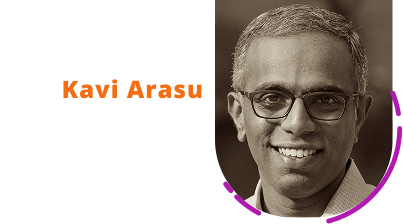

Unlock Regenerative Leadership with the IDGs
10.30 – 12.30
D2/4/A
In this session, we’ll explore the Inner Development Goals (IDGs) framework – Being, Thinking, Relating, Collaborating, and Acting – capacities essential for navigating complexity with clarity and care. Through facilitated exercises, reflective tools, and peer conversations, you’ll connect the IDGs to your own context – and see how they can inform your work.
Whether you’re working with leaders, communities, or youth – this session helps you align the inner work with the outer impact you’re enabling through your sessions. You’ll walk away with a personal roadmap for regenerative leadership and practical ways to integrate the IDGs into your facilitation practice.
Sustainable change starts with how we show up. As facilitators, we hold the space where change begins.
Speakers:


Engineering Hope: Facilitating Inclusive Learning
10.30 – 12.30
D2/4/B
In a world facing complex challenges, how can facilitators create learning experiences that inspire hope and meaningful action? Join us for an interactive workshop through Challenge Based Learning (CBL), a powerful framework that transforms overwhelming problems into manageable, collaborative solutions.
This hands-on session will equip you with practical facilitation strategies to:
- Guide groups from broad concepts to actionable challenges
- Balance divergent exploration with convergent decision-making
- Create inclusive spaces where diverse perspectives drive innovation
- Transform uncertainty into structured pathways for change
You’ll experience a complete cycle, from identifying Big Ideas to developing real solutions, while learning facilitation techniques you can immediately apply in your own contexts. Whether you work in education, community development, or organisational change, you’ll discover how structured facilitation processes can help people move from feeling overwhelmed to feeling empowered.
Perfect for facilitators, educators, trainers, and change agents who want to make learning relevant, engaging, and hope-filled. No prior CBL experience needed, just bring your curiosity and readiness to collaborate!
Leave with a toolkit of facilitation interventions, a deeper understanding of inclusive learning design, and renewed confidence in facilitating groups through complexity toward positive action.
Speakers:


Ubuntu in Action: Facilitating Belonging, Connection and Collective Strength
10.30 – 12.30
D2/4/C
“I am because we are.” – Ubuntu Proverb
What if our true strength as facilitators lies not in the methods we use, but in the deep human connections we cultivate?
In a world marked by isolation and individualism, the African philosophy of Ubuntu invites us to rediscover the power of shared humanity, compassion, and interdependence.
Join this transformative session on Ubuntu: The Spirit of Collective Hope, where we will explore how this timeless philosophy can reshape the way we hold space for others. Through storytelling, dialogue, and practical facilitation tools, we will unpack what it means to truly see and be seen, to foster belonging, restore trust, and build communities grounded in empathy.
Whether you facilitate teams, communities, classrooms, or conversations, this session will leave you inspired to bring Ubuntu’s essence into your practice – nurturing hope not as an abstract idea, but as a lived, shared experience. Come curious, leave connected.
Be part of a circle that reminds us: together, we can hold hope and each other stronger.
Speakers:

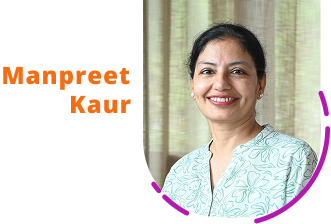
World Cafe: Possibilities for the Next Generation Facilitator
10.30 – 12.30
D2/4/D
Are you ready to envision the future of facilitation? Join us for a transformative World Café session as we celebrate the 30th anniversary of the discovery of the World Café method—a groundbreaking approach that has fostered meaningful dialogue and collaboration worldwide. Guided by the philosophy of “From Me – To We – To Us”, this session invites you to explore and co-create the possibilities for the next generation of facilitators—those who will lead with compassion, innovation, and purpose.
In this focused 120-minute experience, we will honor the legacy of the World Café while diving into critical conversations about the future of facilitation. Together, we’ll explore three core themes: personal growth, collective intelligence, and global impact. Using the dynamic World Café format, you’ll collaborate with peers from diverse backgrounds, share insights, and envision the skills, tools, and approaches facilitators need to thrive in our rapidly changing world.
This session is your opportunity to reflect, connect, and contribute to shaping the future of our profession. Whether you are a seasoned practitioner or an aspiring facilitator, you’ll leave with fresh perspectives, actionable ideas, and a deeper appreciation of the power of facilitation to drive systemic change.
Be part of this milestone celebration and transformative journey—because the future of facilitation starts with us.
Speakers:

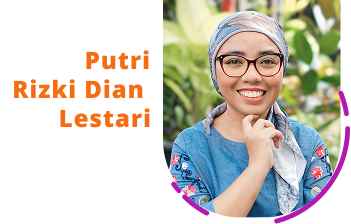
Empowering Teaming with Facilitation
10.30 – 12.30
D2/4/E
This session was inspired by the book <<Teaming: How Organizations Learn, Innovate, And Compete In The Knowledge Economy>> by Professor Amy Edmondson shows that organizations thrive, or fail to thrive, based on how well the small groups within those organizations work. Each teaming opportunity is the place where organization learning happens. In the world where teams are frequently assembled and reassembled, traditional ways of intervention assuming “teams are static over time” no longer works.
“How do we facilitate the teaming process, so the learning and innovation eventually becomes organization edge to compete?”
After almost one year of research and development, the presenters are sharing the result with insights embedded in a card game for facilitators/OD practitioners to enable teaming for organization learning and innovation. The cards contained the wisdom of facilitation that could enable self-directed facilitation in teaming.
Session Agenda
- Introduction and Context
- Warm up exercise: Recognizing boundaries and create boundary objects
- Facilitate Psychological Safety Card Game: Experient self-supported facilitation experience and reflection on Psychological Safety and Failure
- Closing Dialogue: What can we do to enable teaming for organization learning and innovation?
Speakers:
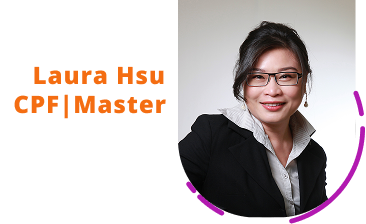


Collaborative Character Education for Gen Z and Alpha: Innovative Methods for Teachers, Parents and Communities
10.30 – 12.30
D2/4/F
How can teachers, parents, and communities work together to raise a generation of resilient, ethical leaders in today’s complex world? Join this interactive session to co-create innovative, culturally rooted approaches to character education tailored for Gen Z and Alpha (ages 5-17).
Through dynamic activities like World Café discussions and role-playing scenarios, you’ll:
- Discover practical strategies to integrate technology, local wisdom (e.g., Pancasila, gotong royong), and stakeholder collaboration into character development.
- Tackle real-world challenges—from screen time to social empathy—with solutions that bridge generational and cultural divides.
- Leave with a personalized action plan to implement in your school, family, or community.
Whether you’re an educator, parent, or community leader, this session will equip you with tools to foster hope, compassion, and resilience in Indonesia’s next generation. Together, we’ll prove that character education isn’t just about teaching values—it’s about building a connected future, one child at a time.
Takeaway: A toolkit of methods, a network of allies, and a renewed sense of possibility.
Speakers:
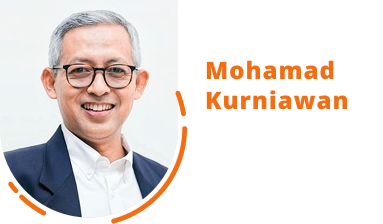
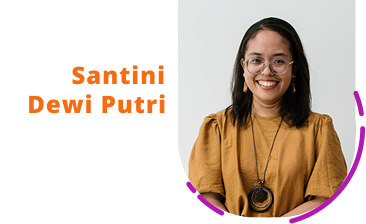
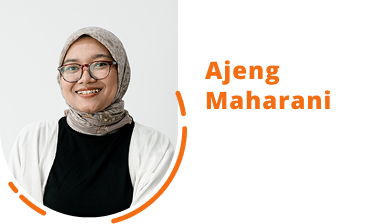
Aham Brahmasmi - Infinite You, Eternal Hope
14.00 – 16.00
D2/5/A
The session deals with the ‘Web of relationship damagers’ based on ‘Gottman’s four horseman of the apocalypse theory’ and discovers how could we work on these relationship damagers with the hope to have better and improved relationships, revive damaged relationships and behave in a more balanced manner in future, keeping in mind the principle of ‘Aham to Tvam/Aney’ and practicing the philosophy of ‘Self regarding to Others regarding’. Finally a ‘Circle of Hope’ is created that would provide eternal hope for making this world more compassionate, empathetic, progressive, balanced and a better place to live for all.
Come join our session to explore your unexplored self and begin the journey towards ‘Aham Brahmasmi’.
Speakers:
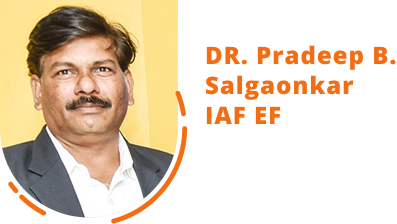
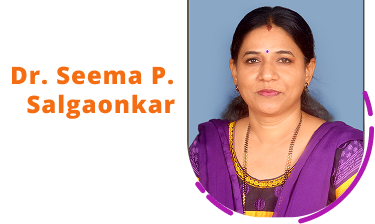
The Infinity - Building Bridges Across Yesterday and Tomorrow
14:00 – 16:00
D2/5/B
Process Infinity – Just imagine a Infinity symbol, the left side loop is our past and right side loop is our future and the center confluence point is our breakthrough point – Now.
The process Infinity is a 15 steps process which begins at Now and then start with left loop visiting 5 stages and then to right loop visiting 5 stages and the quest end at Now the center point again. The process evolve through various stages helping harvest past experiences and creating a possibilities to design the future the way we like.
This process may be used for individual deep dive self reflection as well as in group setting. In process one will experience a wonderful method of churning through chaotic past to pick up the pearls of learning which may be used to design the desired shape of the future. Participants will walk away with key insights about Actions they need to take to shape the desired future.
Participants will also get a complete process details with step by step guide to use it in their own context. Very useful for Leadership Facilitator, for getting Leaders to be in the room and reflect together. Very useful for Coaches, as you will observe the magic of simple questions which can get coachee to reflect deeply.
Speakers:


Cultivating Hope through Generative Social Field
14:00 – 16:00
D2/5/C
How to cultivate hope for myself and my surroundings, when the reality is filled with climate emergency, biodiversity loss, mass polarization, limits to growth, the rise of artificial intelligence – all signifying that the world currently is facing an unprecedented polycrisis? Is hope a reactive stance, or is it a proactive one? How can I, as an individual and as a facilitator, actively cultivate hope?
The session stems from the concept of generative social field, a recent concept developed by leading scientists at Massachusetts Institute of Technology – based on the classic Kurt Lewin’s Field Theory. We will use the Compassionate Systems Framework, developed by Peter Senge and Mette Boell from the Center for Systems Awareness in collaboration with the MIT Systems Awareness Lab, which continuously evolving as an advance concept for facilitating living systems change.
Social field always exist, either generative or degenerative. What many of us are not aware of is that all human beings participate in co-creating the complex social contexts they live in and engage with. In other words, how we show up to a space or group always affects the dynamics in them, in a positive or negative way (Compassionate Systems Framework Compendium, 2025).
In this session, we will explore experientially the notion of generative social field, using the Compassionate Systems Framework. Together we will co-create a space that is safe and supportive, where everyone can feel emotionally safe and connected to one another. Through contemplative practice, reflection, and in-depth sharing, we will attempt to heighten our awareness of the way we habitually show up, as an individual and as a facilitator, and how that contributes to the social field we are in. We will connect the way we show up and generative social field, to the cultivation of compassion and hope. The invitation for one and all is to consciously choose and decide how one is going to show up, so collectively we can cultivate compassion and hope in ourselves and in others, in an attempt to co-create a better, more peaceful, and just world for all.
Speakers:
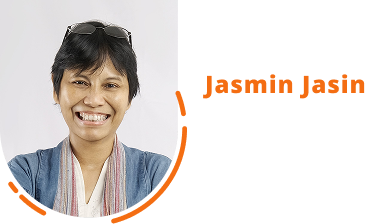
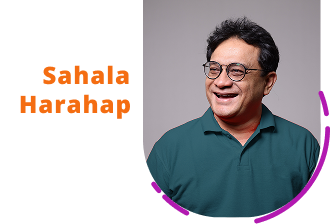
Seeds of Tomorrow: Cultivating Futures Literacy to Grow Your Facilitation Practice
14:00 – 16:00
D2/5/D
What if your next facilitation could help people not only solve today’s problems better—but also anticipate tomorrow’s opportunities? In this hands-on teaser session, we’ll explore the value of Futures Thinking for facilitators working in complex, fast-changing environments. You’ll get a taste of powerful tools like the Futures Triangle, Backcasting and the Polak Game. Whether you work with governments, communities, businesses or NGOs, Futures Thinking offers ways to empower groups to navigate uncertainty and shape change with intention. Expect an engaging mix of play, practice, and insight—all designed to spark curiosity and leave you wanting more. No prior experience needed—just bring your open mind and your facilitator’s heart.
Come for the glimpse—leave with a new lens. The future is a hopeful conversation. Let’s start it together. Let’s facilitate hope!
Speakers:

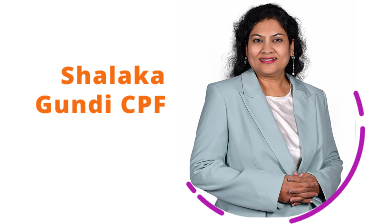
The Stewardship to Sustainability
14:00 – 16:00
D2/5/E
Facilitation for Hope is about guiding open dialogue that sparks connection, resilience, and real, lasting change. In a world facing complex challenges, we need more than quick fixes — we need conversations that help us see fresh possibilities, act together, and nurture regenerative, inclusive cultures.
This session invites us to pause, reflect, and reimagine how we show up — as individuals, teams, and communities — to shape a thriving, just future. Together, we will:
- Discover why transformation is key to sustainability.
- Explore the S.T.E.W.A.R.D Framework through inspiring stories from Asia and beyond.
- Engage in small-group conversations that matter.
- Plant “Seeds of the Future” by sharing ideas and actions.
- Celebrate our insights and leave ready to steward change in our own ways.
Key Takeaways:
– See the difference between short-term solutions and true sustainable impact.
– Reflect on our role as stewards of change.
– Connect and co-create ideas with peers across regions.
Join us. Let’s bring our curiosity, our questions, and our hope — and begin this conversation, here and now.
#FacilitationForHope #Sustainability #IAF #CoCreate #TransformTogether”
Speakers:

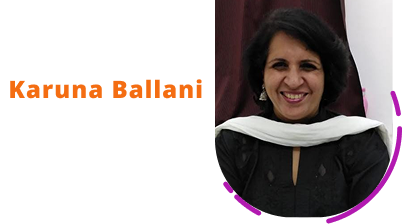
Systems-ness in Social Change
14:00 – 16:00
D2/5/F
Through this session, participants will gain a foundational understanding of systems-based habits, practices, and facilitative moves. These tools will support them in recognising recurring dynamics and underlying mental models, enabling more holistic insights and impactful action in their work with teams and organisations.
Speakers:


Conference Organizer – IAF Indonesia Chapter
The IAF Indonesia chapter is the local chapter in Indonesia, as part of the International Association of Facilitators (www.iaf-world.org) as a global professional body that serves as a home for anyone interested in learning about facilitation, as well as for those who practice it as a profession. Established in 1994, IAF now has members in over 65 countries worldwide. As a professional association, IAF sets internationally recognized standards for facilitation and advocates for the transformative power of facilitation in addressing complex challenges.
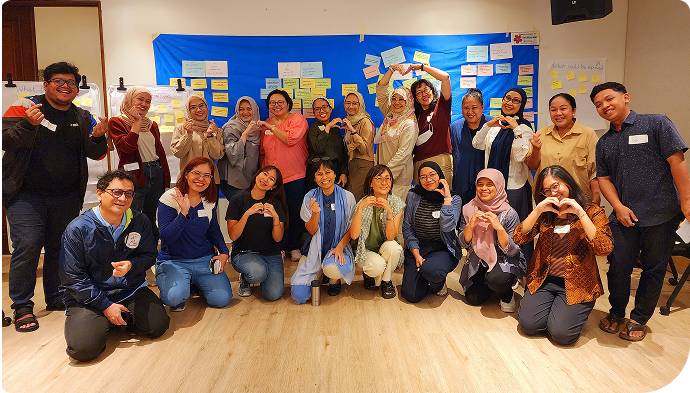

As part of the global network, IAF Chapter Indonesia actively promotes the growth and practice of facilitation through a wide range of programs—both independently and in collaboration with partners. These initiatives span across various sectors, including government agencies, non-profit organizations, educational institutions, and professional bodies. Through workshops, public dialogues, and capacity-building programs, IAF Indonesia continues to build a vibrant and impact-driven facilitation community across the country.
IAF Indonesia Chapter
The Core Team

Meiliana Lany, S.E., CPF
Founder & Board IAF Chapter Indonesia
meiliana.lany@iaf-id.org
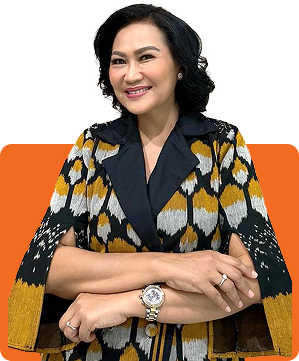
Monica Kumalasari, M.Psi. T
Co-Founder & Board IAF Chapter Indonesia
monica.kumalasari@iaf-id.org

Sahala Harahap, S.Psi., MSM., Psi
Chair IAF Chapter Indonesia
sahala.harahap@iaf-id.org
Meiliana Lany, S.E., CPF
Founder & Board IAF Chapter Indonesia
meiliana.lany@iaf-id.org
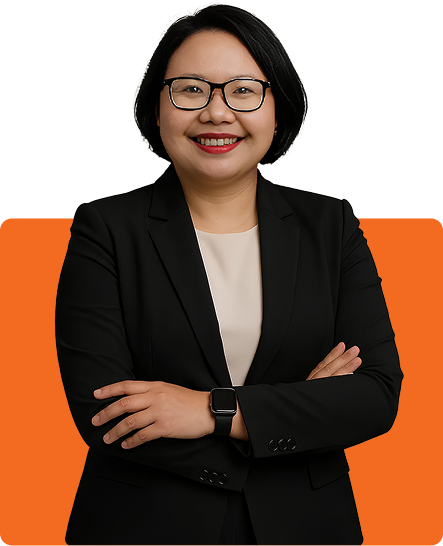
Monica Kumalasari, M.Psi. T
monica.kumalasari@iaf-id.org
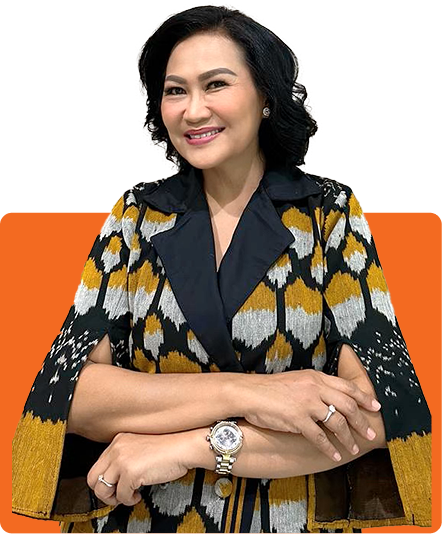
Sahala Harahap, S.Psi., MSM., Psi
sahala.harahap@iaf-id.org
Since 1996, Sahala has facilitated engagement and alignment using systemic, asset- based, and experiential learning approaches across public, private, and social sectors. He holds degrees in Psychology and Strategic Management (UI). A recipient of the Dharma Karya Utama award from the Minister of Energy and Mineral Resources, he has trained with Eagle’s Flight, Asia Works, and global experts, and deepened his practice by becoming Compassionate Systems Certified Master Practitioners a framework for systems change by the Center for Systems Awareness at the Massachusetts Institute of Technology Systems Awareness Lab.

Conference Fee and Registration
(*) Membership code can be found on your membership certificate which can be downloaded from this address upon loging-in: https://www.iaf-world.org/site/members/me
For Indonesian Participants
also KITAS Holders


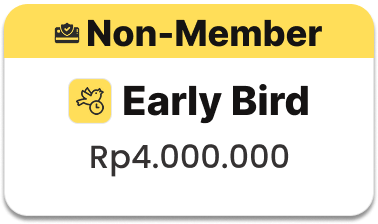

For International Participants
all transactions are in IDR


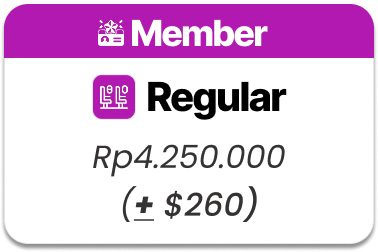
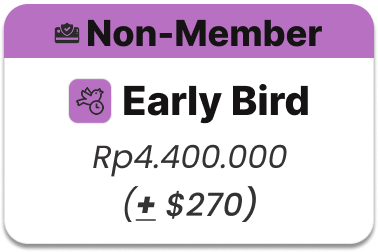
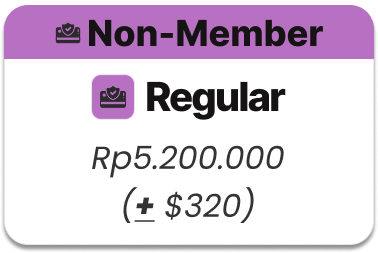

Conference Venue
Prime Plaza Hotel Sanur – Bali
| Hotel Name | Approx. Rate | Distance from Venue | Booking Info |
|---|---|---|---|
| Prime Plaza Hotel Sanur | IDR 980.000 | Conference Venue |
spph.pphotels.com Booking Code IAF2025 |
| Marine Bay Sanur | IDR 900.000 | ± 250 m |
Reservation form https://forms.gle/ketwtMbeJc83XRci8 Whatsapp: +62 8226 6323 045 |
| Sanur Resort Watujimbar | IDR 1.125.000 | ± 2,4 km |
Whatsapp: +62 857 3863 8273 (Septi) Booking Code IAF2025 |
*Room availability is based on first-come-first-serve.
*Rates are for the lowest type of room.
Tips for Bali
Food and drinks
- You cannot drink the tap water, but ice in drinks is safe. Local people use filtered drinking water for making ice. Iced teas, juices with ice, smoothies, etc. are usually ok.
- Be careful of food that looks and tastes like it has been sitting out for a while. Foods spoil more easily in the hot weather.
- Vegetarian/ vegan food is generally widely available at tourist spots and restaurants. However, it may be less available at local neighborhood restaurants, so check the menu before ordering.
Transport
- You can download the Grab or Gojek app and order a car or motorbike. Especially in congested areas, it is faster to travel on a motorbike, but be sure to always wear the helmet provided!
- Bluebird taxis (light blue color) are the official taxis and are generally reliable and safe, but they are available only in certain areas in Bali.
- Private transport is also an option and can be arranged through the hotel. The price is generally more expensive than Grab or Gojek, but it can be a good option if you prefer predictability and want to stop at multiple places.
- After exiting the international arrivals area, go outside following the signs toward the domestic arrivals area. Cross the street where you see the “Bali” sign below. Follow the signs toward the Grab lounge or Gojek lounge, and the staff can direct you to the pickup point.

- The cost from the airport to the Prime Plaza Hotel Sanur will be about 200,000 Rp if using Grab or Gojek.
What to pack
- The average temperature in Bali in early September is 25-30C. It is still the dry season, so usually it does not rain much.
- However, if coming from a cooler climate, be prepared for the heat and humidity. Don’t forget to pack a hat, sun block lotion, and wear loose-fitting breathable clothes. Jeans would be uncomfortable in the weather.
- There are less mosquitos during the dry season, but it’s a good idea to bring mosquito repellent anyway.
- Imported toiletries (cosmetics, etc.) can be expensive. If you have items you use everyday, it’s better to bring them rather than trying to find them in Bali.
Health
Be sure to check with your insurance provider or buy health insurance before arriving in Bali. In case you get sick, the following clinic offers medical care in English:
SOS Medika Bali
Address: Jl. Bypass Ngurah Rai No.194, Sanur Kaja, Denpasar Selatan, Kota Denpasar, Bali 80227
Phone: +62-812-3805-452
Guardian and Kimia Farma are two popular pharmacies where you can find over-the-counter medication.
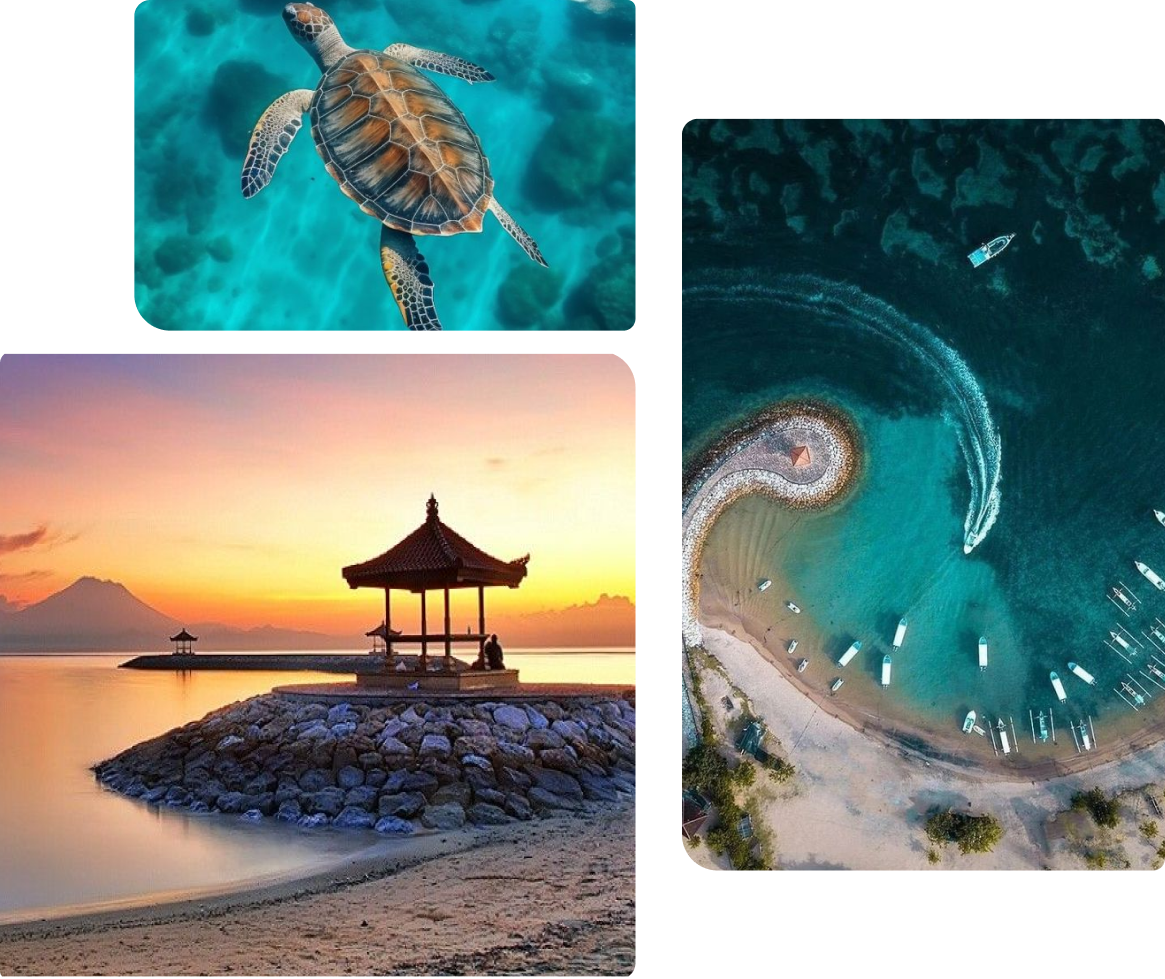
Bugs and animals
- Geckos are harmless for humans and are considered good luck in Bali as they feed on mosquitos, flies, and ants. They are part of everyday life and are commonly seen in buildings.
- Dengue fever is present in Bali and is becoming more prevalent. Take precautions by applying mosquito repellent and covering arms and legs. If you are sensitive to bug bites, applying an ice pack or aloe gel can help.
- Stray dogs are common in Bali. Be careful of petting them, as they may bite or carry rabies.
- Watch out for aggressive monkeys in Ubud monkey forest and other areas.
Cultural considerations
When visiting a temple, dress modestly (covering the arms and legs). Often, the temple can provide a sarong or other cloth. Women who are menstruating are prohibited from entering temple areas.
Avoid stepping on the ceremonial offerings (woven baskets with flower petals inside) that are placed in front of shops and houses.
Some places to visit in/near Sanur:
Karang Beach
Turtle Conservation and Education Center
Museum Le Mayeur
30 minutes by car
Jimbaran Bay fish market and restaurants
Seminyak Beach
Frequently Asked Questions
When is the event?
The conference will be held on Wednesday–Thursday, 3–4 September 2025, Day 1 from 09:00 AM to 06:00 PM and Day 2 from 08.00 AM to 06.00 PM GMT+8.
What is the exact location?
The main venue is Prime Plaza Hotel Sanur, located at Jl. Hang Tuah No. 46, Sanur, Bali, Indonesia. It is about 30–40 minutes by car from Ngurah Rai International Airport.
When can I register?
| Category | Early Bird | Regular |
|---|---|---|
| Indonesian & KITAS Holder – Non-member | Rp4,000,000 | Rp4,700,000 |
| Indonesian & KITAS Holder – IAF Member | Rp3,300,000 | Rp3,900,000 |
| International – Non-member | Rp4,400,000 (~$270) | Rp5,200,000 (~$320) |
| International – IAF Member | Rp3,800,000 (~$230) | Rp4,250,000 (~$260) |
✅ What your payment includes:
- Refreshments: two coffee/tea breaks per day on 3–4 September
- Lunch: full lunch service on both conference days
- Gala Dinner: hosted on 3 September evening
- Conference Kit: complete materials (workshop booklets, name badge, welcome pack)
⚙️ What are not included:
- Breakfast and other meals
- Accommodation
- Local transportation (taxi/grab/etc.)
📍 Additional Notes:
- 🎟️ Take advantage of our highly sought-after Early Bird rates, available starting 21 June 2025, 12 PM (GMT+7)—offered for a limited number of seats. Secure your spot early and enjoy exclusive savings before tickets run out!
- All payment transactions are processed in Indonesian Rupiah (IDR).
Can I register at the venue?
You can not register at the venue, please do the registration through iaf-id.org.
How do I pay for the registration?
Payment is made in Indonesian Rupiah (IDR) via bank transfer or credit card through a secure online platform provided during the registration.
Is there an employee or group discount?
IAF members receive reduced rates. For group registrations or
institutional fee, please email asiaconference2025@iaf-id.org.
Are there any age restrictions for registration?
Participants must be 18 years or older. Should you have younger cofacilitators or student participants that you would like to bring to the conference, kindly notify us through email at – asiaconference2025@iaf-id.org.
What happens if the event is cancelled due to force majeure conditions?
As the event is indoor, disruption due to the weather is unlikely. If cancellation occurs due to force majeure, participants will be notified promptly and partial refunds or deferrals will be arranged.
What are the parking arrangements and directions?
The venue has onsite parking, though availability is limited. If you are not staying in the venue, we recommend you to use public transportation instead.
How do I get around in Bali?
For getting around in Sanur, Kuta, Denpasar area, you can use ridehailing apps (Gojek or Grab, Uber is not available in Indonesia) or metered taxis (Blue Bird). But for further areas (Ubud, Sukawati, Candidasa, Lovina) renting a car might be a better option.
Are there any organized shuttles?
Unfortunately, we do not organize shuttles. But carpooling is easy to arrange on your own using ride-hailing apps (Gojek or Grab) or metered taxis (Bluebird).
Where to stay in Sanur?
We have arranged special rates with partner hotels, please look at the iaf-id.org for direct booking. Besides these hotels, there are plenty of hotels that you can choose in the Sanur area, from the plush 5-stars hotel to a simple bed & breakfast in the alley. Due to high competition, most hotels in Bali are clean, but it is always a good practice to check hotel reviews first.
Is there room to check my bags?
Yes, the venue provides a baggage holding area for early arrivals and post-checkout participants.
What is the dress code?
The dress code is casual-professional and tropical-friendly. We
recommend light, breathable clothing and comfortable footwear. Modest attire is encouraged when visiting temples or traditional sites.
What is the expected weather?
Bali in early September is a dry season with average temperatures around 25–33°C, sunny and humid, but since it is already close to the wet season, expect occasional rain.
Do I need to bring any special equipment?
No specific equipment is required. If you’re leading a session, bring your own laptop, markers, or materials if needed.
What food will be served at the event?
The conference includes daily lunch, coffee breaks, and snacks featuring a mix of Indonesian and international cuisine. The typical food in Bali is halal. Vegetarian food is easy to find in Bali. Jain and Kosher meals are not common in Indonesia.
How do I let you know about special dietary requirements?
You can indicate allergies or preferences by emailing us at
asiaconference2025@iaf-id.org.
Who can I contact if I need assistance during the event?
If you have mobility, sensory, or other accessibility needs, please inform us during registration or email us in advance at
asiaconference2025@iaf-id.org. Our onsite team and volunteers will be ready to assist with navigation, seating arrangements, material access, or other support you may require.
Partners




